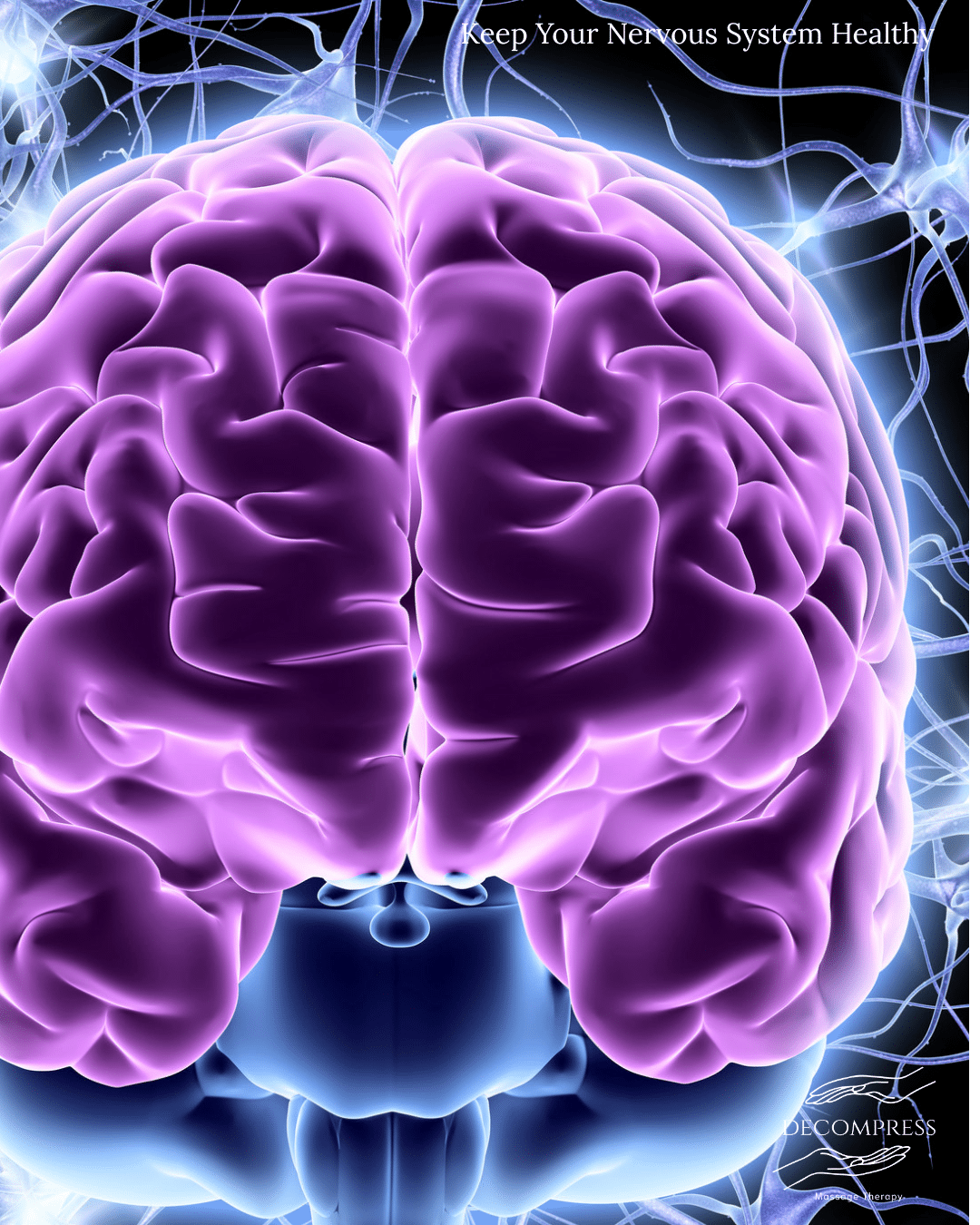Does it seem like everyone is so “stressed out”, but that’s also so normalized that we don’t even see it as a problem anymore? Ever felt like being “busy” was a badge of honor – or made you feel like you had purpose? Do you think about slowing down, but don’t even know how to start?
In this Nervous System Guide, I’ll lay out the basics of your nervous system and what’s happening when your body experiences stress, and also why rest is so important – and how to incorporate more into your life.
I know it’s hard to un-busy your life. My hope is by understanding why our bodies need down time, prioritizing rest will feel easier.

Let’s take a closer look at your nervous system.
There are 2 parts to your (autonomic) nervous system:
- Sympathetic
- Parasympathetic
The Sympathetic is your “fight, flight” system. When your alarm goes off, this is the system that gets your heart rate up, activates the muscles, and tells your body “we gotta go!” It responds to stress/stimulus.
👉Think: alert, aware, moving, vigilance.
The Parasympathetic is the “rest & digest – and sometimes freeze” system. It brings your body to a state of less alertness. Because energy isn’t being put towards getting you up and moving, it can work on other things like digestion, healing, stabilizing your heart rate, and cellular repair.
👉Think: expansion, not feeling rushed, feeling present, connected – receiving massage
Here’s the tricky part: they cannot both be ON at the same time. And that’s ok because your body is built to toggle back-and-forth between the two all day long. It’s a natural cycle and your body is well equipped to regulate normal, everyday stressors.
➡️The problem is most of us are operating in environments where we hang out too long in the alert/responsive phase, overloaded with stress, and our body isn’t getting the chance to calm down and repair.
Here’s another way to look at it:
Being in the Parasympathetic system feels like there’s nothing right in front of you that needs immediate attention. There’s space to settle. Your mind wanders but not with the urgency of getting something done. Massage is a great example of what it can feel like to be in this state, as well as napping, coloring, and listening to the birds. Anything that feels mindful. Anything that helps you feel connected, present, at peace, and grounded.
Being in the Sympathetic system feels alert and on task. You’re working through a to-do list. You’re moving from one thing to the next. You’re driving home from work, paying attention to brake lights and traffic signals. You’re mentally planning dinner, listening to a podcast and remembering you need to call Janet back. It feels active, responsive, and in motion.
💥It’s important to note that one system is not better than the other. It’s not the goal to be in Parasympathetic (calmer) all the time. We need both.
So what happens when you experience a stressful event?
The Amygdala (in the brain) sends a distress signal to your Hypothalamus – which is like a command center. It floods your body with stress hormones that give you the energy needed to respond. So, it’s not a “bad” thing at all – it’s very helpful and necessary. Think about putting your hand on a hot stove🔥this helps your body respond and move your hand away from danger.
The interesting thing about stress, though, is that the body can’t really differentiate between being chased by a tiger🐯 and waking up to an alarm ⏰.
It’s essentially creating the same physiological response to all stressors – a bit of a drama queen 💅
So, while you “feel fine” – and don’t agree that your busy life is “stressful” – your body might feel like it’s running away from tigers all day – which we can all agree would be very stressful. You’ve grown accustomed to high levels of stress, and that might be showing up as road rage, headaches, chronic pain, anxiety – or possibly a feeling of being numb, frozen, or apathetic.
When our bodies experience stress too frequently or too intensely, we start to notice things like
- autoimmune diseases
- high blood pressure
- lack of sleep
- memory loss
- headaches
- anxiety and depression
- and loads of other things that have started to feel “common”
👉And when something feels “common” and everyone is dealing with it – it’s easy to convince ourselves we’re “fine”.
So what are some things we can do to incorporate more down time for our bodies?
First, let’s define “down time.” Many people view rest as a full stop. It can also be 3 big deep breaths at a stop light. Or getting a massage. I want you to think of rest as letting your foot off the gas – not hitting the brakes.
Here are some small ways to incorporate more rest into your life that aren’t sleeping:
- Drink your coffee in the morning without watching TV or your phone. Stare at the sunrise, listen to the birds, or focus on a houseplant.
- Coloring, puzzles, reading, and knitting are examples of mindful, meditative activities that give your body a break from over-stimulation.
- Place your bare feet on the grass
- Take a walk outside
- Participate in a yoga or stretching class – or gently move your body for a few minutes while noticing how it feels
- When trying to add more rest into your life I want you to think about removing stimulus. Even the most mundane parts of life – like brushing your teeth🪥 – can become a restful moment when we focus on just that task instead of brushing our teeth + picking up dirty clothes + checking our phone + putting our shoes all at the same time.
The larger task to think about is reducing the things on your to do list. Often, our stress comes from trying to do too much in a small amount of time. You don’t need a gold medal 🏅in multi-tasking. If it feels like you can’t possibly let anything go – try to reduce or delegate some of the tasks.
If you want to read more about your nervous system and stress, I recommend these books:
1.Burn Out by Emily & Amelia Nagoski
2. What My Bones Know by Stephanie Foo
3.When the Body Says No by Gabor Mate
Plus check out this blog post from the Brain & Science Neuroscience Institute for more tips on how to keep your nervous system healthy.
Your nervous system is a complex, beautiful system that enjoys a healthy balance of experiencing the world and having space to recharge. Let’s allow our bodies to respond and move through enjoying life, as well as giving it moments to relax and repair
P.S. Massage is a great way to calm your nervous system and help you feel balanced.
